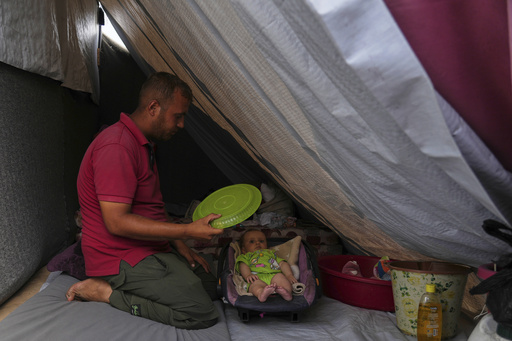In Khan Younis, nestled within the Gaza Strip, the scorching summer relentlessly exacerbates the hardship that residents like Rida Abu Hadayed endure on a daily basis, amid the persistent challenges of a war-torn region.
As temperatures climb above 30 degrees Celsius (86 degrees Fahrenheit), mornings begin with cries from Hadayed’s seven children who are trapped in a cramped nylon tent, sweltering in the oppressive heat. Stepping outside offers no reprieve as oppressive humidity hangs in the air.
With limited resources, the 32-year-old mother resorts to fanning her children with any available object, whether a tray or scrap of paper. Water is poured over them if accessible, yet it is becoming an increasingly rare commodity. “We have no electricity, there is simply nothing,” she laments, her face glistening with perspiration. “My children struggle to sleep and spend the day crying until the sun goes down.”
The intense warmth of summer multiplies the challenges faced by the 2 million residents of Gaza. Decreased water supplies, compromised sanitation systems, and increasingly cramped living conditions threaten to spiral into widespread health issues, as aid organizations have persistently cautioned.
The heat wave coincides with a critical shortage of clean water affecting most of Gaza’s inhabitants, many of whom take shelter in makeshift tent communities. Palestinians in the strip often trek long distances to gather water, carefully rationing each drop which impacts their ability to maintain hygiene and stay cool.
“We are only at the beginning of summer,” said Yousef Abu Hadayed, Rida’s husband. “And our situation is dire.”
For nearly three months, Israel blocked essential supplies, including food, fuel, and medicine, from entering Gaza. While limited aid commenced in May, essential fuel supplies needed to extract water from wells or run desalination plants remain scarce.
Due to fuel shortages, reports by the United Nations Office for the Coordination of Humanitarian Affairs highlight that only 40% of Gaza’s drinking water facilities are operational, teetering on the brink of collapse, with 93% of households facing water scarcity, as revealed in a June assessment.
The Hadayeds were displaced following evacuation notices prompting them to vacate eastern Khan Younis. “Our life in the tent is truly miserable,” shared Yousef. “We spend our days pouring precious water over our children’s heads and skin, but even accessing water is a formidable challenge.”
Recently, a UNICEF spokesperson emphasized the dire consequences if fuel entry into Gaza is not permitted, warning that children are at risk of dying from thirst.
“I spend my days drenched in sweat alongside my children,” said Reham Abu Hadayed, a 30-year-old relative of Rida, also forced to leave eastern Khan Younis. She is constantly worried about her four children’s well-being. “I don’t have enough money for their medicine,” she admitted.
For 23-year-old Mohammed al-Awini, the unbearable heat is compounded by swarms of flies and mosquitoes, particularly troublesome at night.
With insufficient sewage networks, trash accumulates on the streets, attracting pests and spreading disease. The odor of decaying waste lingers in the air. “We remain awake all night, tormented by mosquito bites,” he explained. “We feel like some of the most exhausted people on the planet.”


